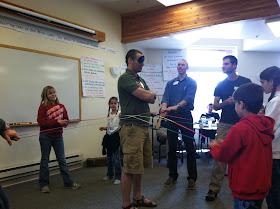Given everyone's different timing considerations during this transition year, we're taking the SPLICE (Spiritual, Personal, Lifestyles, Interpersonal, Cultural, Endurance, Enjoyment) missionary training course at separate sessions offered throughout the year. We look forward to reuniting in France for language school in August and discussing our observations, reflections, & experiences with our shared SPLICE language. I blogged about the language acquisition portion of the training here and I'm sure you'll hear more about that as other teammates complete that course and we all put our phonics and language acquisition techniques to practice in France and Burundi.
During this first week of SPLICE, the message highlighted for most of my fellow missionaries here this session has been "Paradox." "It was the best of times! It was the worst of times!" Or, as they explain this to the missionary kids: a "pair of ducks" ("yuck duck and yeah duck"). This is the tension we live in as we look to our unknown future. We look forward to the anticipated joys of our work in Burundi and yet we mourn aspects of distance from family, cross cultural adjustments, etc. Lots of yeah ducks and lots of yuck ducks.
"Allowing the seemingly contradictory statements to lie side by side without weakening one statement is a goal of SPLICE."
So yesterday morning, we participated in this exercise (illustrated above) with both adult and kid SPLICE participants. The tension on the strings included reality vs. expectations, joys vs. sorrows (yeah and yuck ducks), others' expectations, & intensity. The other interesting addition was a jacket to insulate the person from the sorrows (unfortunately also insulating against feeling some of the joys).
Following this discussion, the children all went on a field trip to Garden of the gods.
 | ||
| Garden of the gods (pics taken on my recent visit there) |
One child was pinned under the tree. Another sustained whiplash and head/neck lacerations as the tree brushed his head when it fell. Quite a few kids were scraped by branches.
A trauma nurse who "happened" to be walking by was on the scene within seconds. The teenagers and childcare staff quickly moved the tree off the 11 year old boy. Ambulances, park rangers, police began to arrive. The two boys mentioned above were taken to the hospital in an ambulance and their parents met them there. The other children were brought back to MTI and underwent an extended debriefing time with their parents and SPLICE teachers drawing pictures about their experiences and discussing their fears.
After CT scans, x rays, and evaluations in the emergency department, both boys were determined to be ok with only minor injuries and were released home.
We praised the Lord for His protection of all the children and spent significant time in worship today as a community.
Amazingly when the family of the 6 year old boy arrived at the hospital and found their son lying on a stretcher in a neck brace, he told them immediately, "Mom and Dad, I had three yeah ducks today and one yuck duck. But the yuck duck was a really big one!" His "yeah ducks" were hiking at Garden of the gods, that his team won the game they played, and that he got to ride in an ambulance. :) He didn't like the neck brace, and his mom explained that it was necessary for his protection until they knew if his neck was ok. His response, "Yeah, it's a paradox!" Pretty impressive understanding and application for a 6 year old! Hopefully this experience will continue to encourage his faith as his family heads to a difficult mission field.
One funny moment of the traumatic events of yesterday was when the police started asking the kids their addresses. They didn't know what they were. No, it wasn't concussion, just a bunch of homeless missionary kids in transition between worlds. Another paradox we were able to laugh about as a community!
We're thankful for this training beneficial for kids and adults and we appreciate your continued prayers for our McCropder team as we live with paradox.






